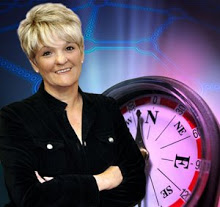If you are thinking about leaving your job, starting a business, or
expanding your business, I'll just bet you may be experiencing some fear of making a mistake.
For instance, have you ever experienced this?
You have an idea - a good idea that you're excited about. Then maybe you
think: "I could turn this idea into
a book - and then into DVD's or maybe even a multi-media project. Maybe I could add graphics and special
effects. Wait!! I don't know how to do any of that. I don't even know if there is a market for
this, and I don't know how to find out. Probably no one wants it anyway. What
am I thinking!!”
This all happened in a split second.
And now you're feeling stuck because you've run out of ideas. And, you
are terrified to make a decision for fear it will be the wrong one, and, you
feel awful about yourself because you can't seem to make any progress.
This "fear of making a mistake pattern" is "perfectionism at work." Perfectionism
is an addiction to lack. That's why
perfectionists struggle to succeed. The
perfectionist only sees what isn't there, what they don't know, what the
problems are. They will argue for their limitations. They will explore all the possibilities for making mistakes. Their lives and businesses
are filled with "Not Enough".....not enough confidence,
decision-making, and risk taking resulting in not enough clients, support,
staff, and income. You may even think: "Why can't I get it right!"
Now, we all have moments of feeling inadequate. This "not enough" comes from fear,
uncertainty, insecurity, and terror of making decisions in case they're wrong,
and we learned it early on in childhood no matter how stellar our parents may
have been. Many of us may not have had
anything close to the ideal upbringing, and we are still viewing our lives and
work through those younger eyes.
I have certainly experienced this for myself, and realized at one point,
I was trying to run a grown up business with a 5 year old emotional body.
So here are a few tips to break the cycle:
• Recognize you are afraid, but understand it is
NOT the smart, savvy, experienced adult person you are, but a very scared 5
year old. (Yes, you do have a very adult
side to you.) But, treat yourself with
gentleness and respect just like you would any young child. If you are critical,
that part of you will shut down even more, and your business can really stall.
Like it or not, the child in all of us runs our world, so be kind.
• Lower your expectations. Keep it light. Experiment often. One of my favorite quotes
is from a former coach of mine:
Anything worth doing is worth doing badly. She also told me that if I wanted to
be successful there is no room for perfectionism. I have found that to be sage advice.
• The More Mistakes, the
More Success. Mistakes are
just experiments that didn't turn out as expected. Major industries have
evolved from big mistakes. In 1970 Spencer Silver at 3M was told to make a
strong glue, but it was a tragic failure because he only produced this slightly
sticky substance, which is now known as Post-It Notes, 3M's most successful
product.
Ruth Wakefield,
proprietor of the Toll House Inn, was having trouble with her cookies and added
some broken pieces of chocolate that, to her surprise, never melted properly in
the batter. Voila! The chocolate chip
cookie was born and was named after her inn and is still the most popular
cookie in the world providing jobs to thousands of workers. You get the idea. The list of success from mistakes is very
long.
• Take it Slow. If you have a great idea, or any idea, get
support from other people so you don't race into the "What- made- me-
think- I- could-do- this- so- it's- over" mode. Run it past trusted
advisors, a coach or mastermind group so they can help you break it down into pieces
and talk you off the ledge. You need support and soothing, and most of us just
can't do it for ourselves.
• Any Action Creates Momentum. Just keep focused on what you want and take tiny
steps. You don't have to do everything overnight. Actually the big approach
usually slows us down because we get scared. With smaller steps, you can easily
self-correct. You're less likely to make
big errors, but action, ANY action creates momentum. It doesn't have to
be big or bold; just consistent.
And, one day, you'll realize you have achieved a goal, and it was so
imperfect and non-stressful that you will actually wonder how it
happened!! Here's to achieving your
success and enjoying all its imperfections!





